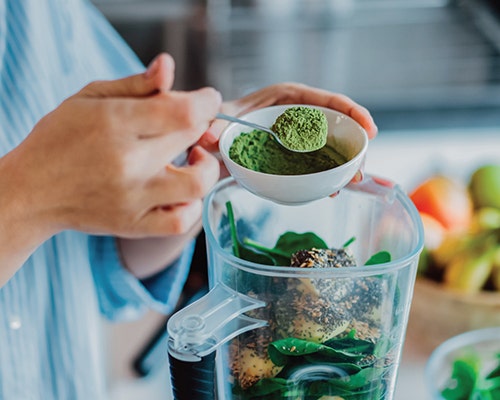Signs That More Potassium is Essential
- 10/23/19

by Tracey Pollack
When it comes to nutrients, everyone talks about the alphabet of vitamins, the pros of probiotics, and the strength of iron and calcium. But few ever praise potassium for its importance to your health. You may not realize that potassium is vital for every cell in your body. It keeps your heart pumping, your muscles moving, your energy up, your blood pressure down and so much more. But far too many people consume far too little potassium. Are you one of the many missing out? Get the lowdown on why this mineral is a must and whether your levels are too low.
Why Potassium is a Priority
Potassium is the unsung hero of the nutrient world. This essential mineral is an electrolyte that works behind the scenes to keep your body functioning properly in a number of ways. Along with protecting your heart and carrying nutrients throughout your body, potassium keeps your muscles moving smoothly and prompts your nerves to send out signals. It also helps you maintain a healthy balance of fluids and electrolytes, while flushing out excess sodium to lower your blood pressure.
Four Symptoms of Low Potassium
When you don’t get enough potassium from your diet, your body will let you know in the following ways.
If you’re tired of feeling tired all the time and your energy is constantly low, you probably need more potassium. Fatigue is one of the first signs of a potassium deficiency since the mineral is responsible for energy production. When you don’t consume enough, don’t be surprised when you start to feel drained, drowsy and lousy.
If you’re low on potassium, your muscles will send you the message. That’s because the electrolyte is essential for smooth muscle contraction all throughout your body. When your levels are too low, you may be plagued by sudden spasms, especially when you exercise.
Simply put, potassium is sodium’s sidekick. When you get too much sodium and not enough potassium in your diet, your sodium level soars, which causes your blood vessels to constrict. This results in high blood pressure. But it’s potassium that comes to the rescue by flushing excess sodium out of your body. This enables your blood vessels to relax, which helps to lower your blood pressure.
If most of your food comes in boxes or bags, you’re probably lacking potassium. That’s because the mineral is most abundant in fruits and vegetables—sorry, but potato chips don’t count! Eating lots of processed foods and too much sodium are sure signs that your level is lacking. But the fresher your food, the higher your potassium level, and the better your body will feel and function.
Does your heart feel like it’s fluttering, pounding or missing a beat? Too little of this vital mineral may be messing with your heart rate. When your body’s balance of sodium and electrolytes is out of whack, your heart has a harder time pumping, which can lead to an irregular heartbeat.
How to Pump Up Your Potassium Intake
Sadly, most people only get around half of the recommended 4,700 milligrams per day of potassium. Luckily, it’s easy to increase your intake by eating more fruits and vegetables, along with fewer processed and packaged foods. While the first food that comes to mind may be bananas, other foods are also packed with potassium, such as baked potatoes, tomato sauce, watermelon, cooked spinach, black and white beans, salmon, acorn and butternut squash, yogurt, dried apricots and avocados. And if you don’t know if your level is low, speak to your doctor because a deficiency can be dangerous.
By getting enough potassium in your diet, you’ll tip the balance in favor of better health.
When it comes to nutrients, everyone talks about the alphabet of vitamins, the pros of probiotics, and the strength of iron and calcium. But few ever praise potassium for its importance to your health. You may not realize that potassium is vital for every cell in your body. It keeps your heart pumping, your muscles moving, your energy up, your blood pressure down and so much more. But far too many people consume far too little potassium. Are you one of the many missing out? Get the lowdown on why this mineral is a must and whether your levels are too low.
Why Potassium is a Priority
Potassium is the unsung hero of the nutrient world. This essential mineral is an electrolyte that works behind the scenes to keep your body functioning properly in a number of ways. Along with protecting your heart and carrying nutrients throughout your body, potassium keeps your muscles moving smoothly and prompts your nerves to send out signals. It also helps you maintain a healthy balance of fluids and electrolytes, while flushing out excess sodium to lower your blood pressure.
Four Symptoms of Low Potassium
When you don’t get enough potassium from your diet, your body will let you know in the following ways.
- You’re Weak and Weary
If you’re tired of feeling tired all the time and your energy is constantly low, you probably need more potassium. Fatigue is one of the first signs of a potassium deficiency since the mineral is responsible for energy production. When you don’t consume enough, don’t be surprised when you start to feel drained, drowsy and lousy.
- Cramps are Cramping Your Style
If you’re low on potassium, your muscles will send you the message. That’s because the electrolyte is essential for smooth muscle contraction all throughout your body. When your levels are too low, you may be plagued by sudden spasms, especially when you exercise.
- Your Blood Pressure is Sky-High
Simply put, potassium is sodium’s sidekick. When you get too much sodium and not enough potassium in your diet, your sodium level soars, which causes your blood vessels to constrict. This results in high blood pressure. But it’s potassium that comes to the rescue by flushing excess sodium out of your body. This enables your blood vessels to relax, which helps to lower your blood pressure.
- Your Diet is Junk
If most of your food comes in boxes or bags, you’re probably lacking potassium. That’s because the mineral is most abundant in fruits and vegetables—sorry, but potato chips don’t count! Eating lots of processed foods and too much sodium are sure signs that your level is lacking. But the fresher your food, the higher your potassium level, and the better your body will feel and function.
- Your Heart is Racing
Does your heart feel like it’s fluttering, pounding or missing a beat? Too little of this vital mineral may be messing with your heart rate. When your body’s balance of sodium and electrolytes is out of whack, your heart has a harder time pumping, which can lead to an irregular heartbeat.
How to Pump Up Your Potassium Intake
Sadly, most people only get around half of the recommended 4,700 milligrams per day of potassium. Luckily, it’s easy to increase your intake by eating more fruits and vegetables, along with fewer processed and packaged foods. While the first food that comes to mind may be bananas, other foods are also packed with potassium, such as baked potatoes, tomato sauce, watermelon, cooked spinach, black and white beans, salmon, acorn and butternut squash, yogurt, dried apricots and avocados. And if you don’t know if your level is low, speak to your doctor because a deficiency can be dangerous.
By getting enough potassium in your diet, you’ll tip the balance in favor of better health.




